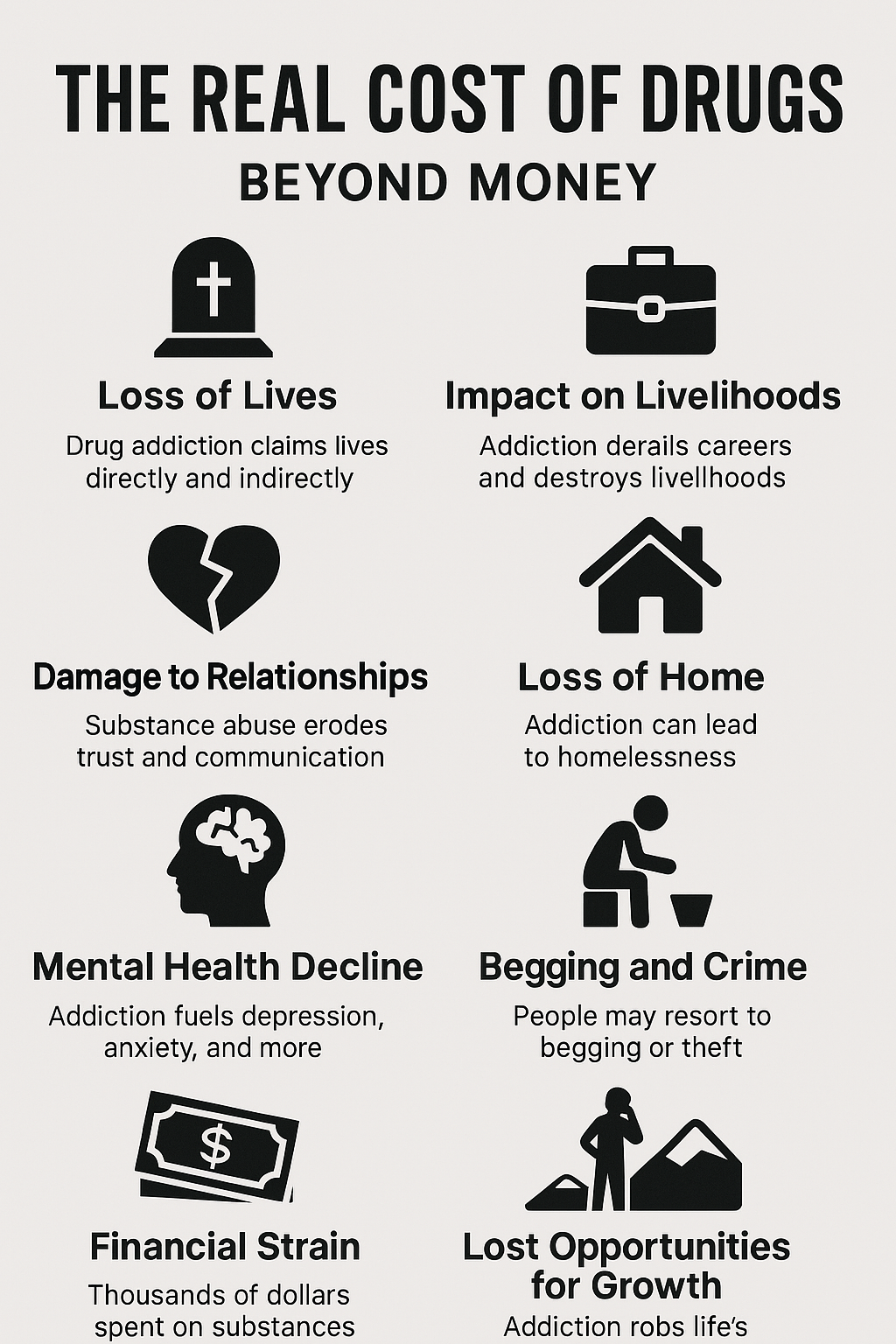The Real Cost of Drugs

Beyond Money
Drug addiction is often discussed in terms of its financial toll, but the true cost of substance abuse extends far beyond the money spent. It impacts lives, livelihoods, relationships, mental health, and even the ability to enjoy life’s simple pleasures. Here’s a closer look at the devastating ripple effects of drug addiction.
Loss of Lives
Drug addiction claims lives directly through overdoses and indirectly through health complications, accidents, and risky behaviours. Beyond the individual, families and communities suffer the grief of losing loved ones. Addiction also increases the risk of suicide and violent encounters, leaving behind emotional scars for those left behind.
Impact on Livelihoods
Addiction can derail careers and destroy livelihoods. It affects focus, productivity, and reliability, making it difficult to maintain steady employment. Absenteeism, forgetfulness, and irritability often lead to job loss or demotion. For young people especially, drug abuse hampers their ability to engage in meaningful work or education, perpetuating cycles of poverty and social exclusion.
Damage to Relationships
Substance abuse erodes trust and communication in relationships. People struggling with addiction may lie, manipulate, or hide their behaviour from loved ones, leading to breakdowns in trust and emotional disconnection. Families often bear the brunt of this damage, experiencing betrayal, resentment, and fear as addiction takes precedence over personal connections.
Loss of Home
Addiction can lead to homelessness when individuals lose jobs or alienate family members who might otherwise provide support. Drug use often consumes resources that would go toward rent or mortgage payments. Homelessness exacerbates the cycle of addiction by increasing vulnerability to further substance use and crime.
Mental Health Decline
Drugs profoundly affect mental health by rewiring the brain’s reward system. Addiction can lead to depression, anxiety, paranoia, psychosis, and other mental health disorders. The emotional pain caused by addiction often traps individuals in a cycle of guilt and despair that worsens their dependency.
Begging and Crime
As addiction progresses, individuals may resort to begging or criminal activities like theft to fund their habit. These actions stem from desperation rather than malice but carry severe consequences such as legal troubles, incarceration, and further alienation from society.
Financial Strain
The monetary cost of addiction is staggering. Individuals may spend thousands annually on substances while neglecting essential expenses like healthcare or bills. Over time, financial instability leads to damaged credit scores and an inability to afford meaningful experiences like travel or gifts for loved ones. Addiction robs people not only of money, but also the opportunity to invest in their future happiness.
Lost Opportunities for Growth
Perhaps one of the most tragic costs is how addiction prevents individuals from enriching their lives. Instead of spending money on experiences that foster personal growth like travelling or pursuing hobbies, addiction narrows one’s focus solely on obtaining substances. This stifles creativity, diminishes self-worth, and limits one’s ability to see beauty in the world.
Choosing Recovery Over Addiction
The path out of addiction is challenging but possible. Recovery offers a chance to rebuild relationships, restore mental health, regain control over finances, and rediscover life’s joys. By seeking help through therapy or treatment programs, individuals can break free from the destructive cycle and reclaim their lives.
Drug addiction isn’t just about money it’s about everything that makes life worth living. Recognizing its broader costs is crucial for understanding why recovery matters so deeply not just for individuals but for families and communities as well.